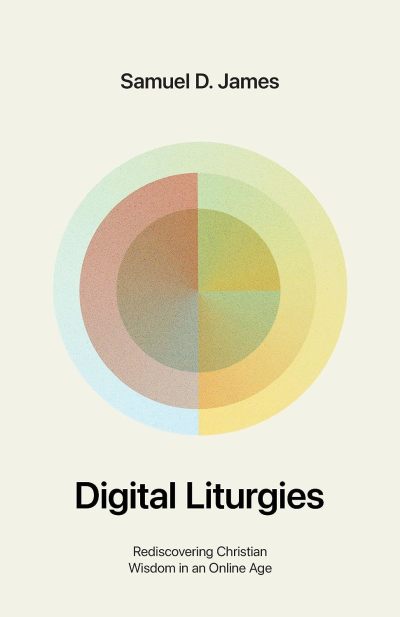Author of ‘Digital Liturgies’ on how Christians can live wisely in an online age

Cultural commentator Samuel D. James discussed the influential and formative power of the internet in a recent interview. James’ newest book, Digital Liturgies, explores the hidden ideology and worldview-shaping nature of internet technology, as well as how Christians can rightly navigate through the digital world in faithfulness to Christ.
James is the associate acquisitions editor at Crossway. His Substack newsletter, also entitled Digital Liturgies, has thousands of regular subscribers, and he has written for several other publications, including The Wall Street Journal, National Review, Time, First Things and The Gospel Coalition.
The following is an edited transcript of my interview with Samuel D. James.
Cap Stewart: Many Christians tend to think the internet is like any other amoral tool: you can use it wisely or poorly. What do you think is wrong with that perspective?

Samuel D. James: I think something can be used for good or ill and still not be neutral. And what that means is that even our desire to use this technology well is shaped by the logic of the technology itself.
For example, the internet presents us with certain powers and abilities — the ability to broadcast ourselves, the ability to turn something that would otherwise be a private moment into what other people can watch or consume. Technology allows us to turn life into a broadcastable moment, and because this technology exists and can do that, it says to us that we should do this, that this is a good thing.
Even as we are purposing to use these technologies for good — and I think we can — we need to ask, “How is this changing our emotions? How is it changing our expectations? How is it changing our view of ourselves, of other people, of God?” Those questions are central to the book.
Really, what I’m trying to do is invite Christians to consider the ways in which these intellectual technologies — the web and social media in particular — make plausibility structures that themselves tend to lead us toward thought patterns and feelings and behaviors that are contrary to Christian wisdom.
Stewart: That actually leads directly into our second question. The subtitle of your book is Rediscovering Christian Wisdom in an Online Age. What is it about being online that you think causes us to lose our grip on wisdom?
James: In the Scriptures, wisdom is connected to this sense of what the world is really like. Some have said that the essence of wisdom in Scripture is to live along the grain of reality rather than against the grain.

In contrast, the web presents us with a vision of ourselves and of other people that is untrue because it is disembodied. God created you and me with physical bodies — not just with minds, but with hands and feet and eyes. As part of that embodiment, he created us in particular places. He gave us to particular parents that live in particular cities. These are realities you don’t have control over: they exist whether or not you want them to.
This reality is something the internet obscures: the internet is this kind of language, educational, relational — and even worshipful — habitat that presents to us as something that is completely in our control. If we want to stop seeing something that makes us uncomfortable, we can simply click away. If we see somebody who is saying something we don’t like, we can mute or block them. The internet offers this entirely controlled way of experiencing the world. And as such, it presents us with a vision of reality that is fundamentally untrue.
Christian wisdom starts with this baseline of reality, and the internet starts with this baseline of unreality. And the question is, what happens when our attention, our emotional energy, and our labor are concentrated in this sphere of “reality,” when in fact the Scriptures are calling us to live emotionally and attentively in objective reality.
Stewart: You mentioned this idea of control — of muting and blocking others. Is there a relationship between internet culture and “cancel culture”?
James: Absolutely. And it actually goes back to what I was saying just a second ago. Many have learned to engage the world through these digital controls. They spend more time online, they have likely learned how to work online. The internet has become this package deal for doing life, for experiencing the world.
When you experience reality — and particularly when you come of age — online, it’s near impossible to imagine not being able to control what you see. What happens for a lot of folks is that they simply don’t understand why someone should be allowed to do something that makes them uncomfortable. There’s a sense of disempowerment that comes when you’ve learned to engage the world through the computer logic, and then you encounter something in the offline world and you realize you have no power over it. That cognitive dissonance is deeply traumatic (for lack of a better word). You just don’t know how to comprehend it.
This doesn’t explain the whole of cancel culture, but it is, I think, a part of it.
Stewart: How else does digital technology encourage us to be upset or offended by disagreement?
James: In his book The Shallows, Nicholas Carr uses cognitive research to show that reading online engages our cognitive function at a much shallower — and more superficial — level than reading a book. Partly, that’s because the internet is designed to be a kind of multitasking interface. Even if we don’t think we’re being distracted, we really are because this is simply the way the technology works.
I recently wrote two articles on singleness in the church, and last night I got a comment that accused me of believing all these things that are explicitly disowned in the article. Before I read Nicholas Carr, I would have thought, “People just don’t know how to read.” But now I realize it’s not an issue of education; it’s literally a cognitive deficiency with the way we’re communicating on this medium.
It’s not necessarily all the reader’s fault (although it can be). But to be carefully reflective on the internet is basically to cease to exist, because the algorithm won’t allow you to rise to the top of the internet’s ecosystem.
Stewart: You have said elsewhere that the internet does not just contain pornography, but that it is pornographically-shaped. What do you mean by that?
James: Essentially, pornography takes what is fundamentally a personal experience between two people (in the Christian understanding) and turns it into a product that can be consumed by a third party, who then instrumentalizes that experience. Similarly, the internet is this infrastructure that takes every human experience and turns it into a consumable product.
And if you go into the weeds of social media, you find that the word “porn” has now become suffixed to certain genres to indicate when a lot of images are being created of something. So “earth porn” is beautiful landscapes from all over the world. “Food porn” is delicious looking dishes. People have this pornographic lingo to describe what it’s like to experience these things third-hand — through the screen. The logic of pornographic consumption is hardwired into many of these technologies.
Stewart: If the internet is inherently pornographically-shaped, should we even be using it at all?
James: I understand where that question comes from, but we need to understand a distinction: there’s a difference between the internet being pornographically-shaped and the internet being exclusively pornographic. I’m saying the former, not the latter. And so, it might be better to ask, “If the internet is pornographically shaped, what does it mean to order our lives so that we’re not going to YouTube for friendship, or that we’re not going to Instagram to experience life? Have we retreated from other people? Have we retreated from healthy practices? Have we retreated from the things that make life difficult but also rewarding — and that push us toward faithfulness to Jesus?”
One challenge a lot of pastors are facing right now is that people are saying, “Why can’t I just watch church? Why can’t I stay home and do livestream?” I actually believe pastors should think about responding more in the language we’re using right now: “Well, you are experiencing church as something that only happens to you, something that you are consuming as a product. That’s not what church is. Livestreaming is to church what porn is to sex.”
Stewart: What are some benefits for Christian involvement in the online world?
James: There’s no question that the internet has revolutionized how we share information. The access we have to sermons and music and millions of pages of books — it’s astounding. The relational significance is not to be dismissed either: through texts and emails and video calls we keep up with friends who may be living in the furthest reaches of the world.
And this is an incredible time for the dissemination of the Gospel. There are Gospel messages going into restricted countries — all over the world — and getting into the hands of people who would otherwise never receive it.
It’s not a question of whether there’s any good reason to use the internet. It’s a question of how do we put the internet in its proper place? How do we let it be a blessing instead of letting it turn into something else?
Stewart: Who is a good example of a Christian engaging with internet culture in wisdom and prudence? How can we learn from their example?
James: One of my really good friends, Nate, is a pastor in North Carolina. On Facebook, he posts encouraging quotes and things he’s studying in Scripture. But he consciously chooses to make the people that God has actually put around him foremost in his attention. There’s an intentional design for him to say, “Whether it’s my wife, my kids, my church, the people in my community — those people are entitled to the lion’s share of my emotional energy, of my affection.” And he’s living life accordingly.
That’s what I would tell readers: don’t look to a guru, a Christian celebrity, for examples of how to do this. Find people in your life who just seem to be very present, to be devoted to the things that matter, and follow them as they follow Christ.
Stewart: How does the Gospel contradict and/or fulfill the digital liturgies of our day?
James: If we think we’re looking for friendship, the Gospel promises Christ our brother, our friend, who is with us, but who also puts us in a family of other Christians. If we’re looking for significance, the Gospel gives us a kingdom to belong to, and gives us people to serve, with the promise that even if the world doesn’t see us, our Father (who sees in secret) will see and reward us. If we’re looking for intimacy (in obvious or not obvious ways), the Bible presents us with a vision of sexual intimacy, but also of friendship intimacy that is grounded in the Gospel.
So the question is, if all the major web companies were to disappear tomorrow in some cataclysmic cyberattack and we couldn’t be online, would we be OK? Would we still have friends? In the Gospel, the answer is yes.
But there may be some who would say, “If that happened to me, I would cease to have an identity. I would not know who I was.” To them in particular, I would say go back to the Scriptures. Learn who you are from your Creator — not from your audience — and embrace that. Embrace the promises of the Gospel that will sustain you long after your internet self has ceased to win the algorithm.
Digital Liturgies is now available at Crossway and everywhere books are sold.
Cap Stewart is the author of the curriculum Personal Purity Isn’t Enough: The Long-Forgotten Secret to Making Scriptural Entertainment Choices. As a cultural commentator, he has contributed to Cultural Engagement: A Crash Course in Contemporary Issues (Zondervan Academic, 2019), among other print and online publications. He writes at Unpop Culture.





























